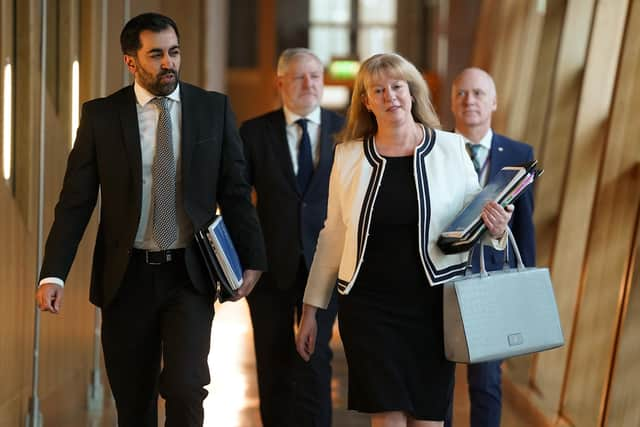Scottish Budget: Shona Robison's 'blame the English' approach to Scotland's economic problems won't solve them – Scotsman comment
Scotland’s Finance Secretary only came to life when it was time for some graceless party political knockabout with opposition MSPs.
While it can be a mistake to be distracted by presentation, a speech so devoid of intellectual thread or narrative heart can point to bigger problems with its substance. As an advertisement for a dynamic, “open for business” Scotland, this was certainly one to keep off the highlights reel for potential overseas investors.
Advertisement
Hide AdAdvertisement
Hide AdThe main audience Robison had in mind was, it appeared, more domestic: wavering SNP supporters, to be precise, given the repeated attacks on the UK Government. The broad thrust: forget that UK taxation is at a record high in modern times: Tory austerity is to blame for all Scotland’s woes.
Rhetorically, this was thin gruel. A vitally important question was left unasked, never mind unanswered: how to stimulate the Scottish economy so we can afford the public services we want. Robison’s only growth idea was to mandate even higher taxes than the rest of the UK.
As she announced a new 45p tax band, Robison said that Scotland’s “distinct approach to income tax rates and bands as compared with elsewhere in the UK” meant that there would be about £1.5 billion of additional revenue in this Budget.
“Distinct” is one view. Another is that our taxes are £1.5bn higher than they might be.
And what do we get for our money? It would be reasonable to say many Scots would accept higher taxation were public services better. The problem is, in important areas, they are substantially worse.


Earlier this year, Public Health Scotland figures showed that while only a few hundred people in all England wait more than two years for treatment, more than 7,800 people in Scotland face this utterly unacceptable situation.
More recently, the international Pisa education assessment showed our schools’ performance in reading, maths and science had slumped.
All this, and anemic economic growth too. As Labour MSP Michael Marra pointed out, if our economy had grown at the same rate as the UK’s as a whole between 2012 and 2021, it would be more than £8 billion bigger.
Advertisement
Hide AdAdvertisement
Hide AdThat prosperity gap is only likely to grow after Robison ignored calls to match the 75 per cent business rates relief for hospitality, leisure and retail premises introduced south of the Border, although she did announce help for island hospitality businesses and businesses whose premises are valued at less than £51,000.
Increases in arts spending, although modest, were also welcome.
But the bottom line is that were our economy growing faster, closer to the UK’s overall, then we would have more money to spend on truly Scottish priorities. That would take strong leadership, however, willing to make decisions for the benefit of the country, rather than narrow political opportunity. We have lacked that leadership for years.
Choices, made in Edinburgh, have led us to here, and Scotland was in a bad way before this budget.
We should all worry that things may have just taken a turn for the worse.
Comments
Want to join the conversation? Please or to comment on this article.
